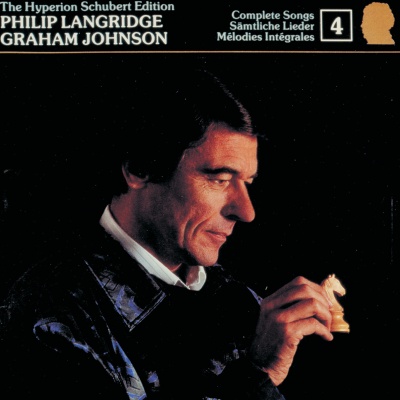
Schubert: Hyperion Song Edition 4 – Schubert & His Friends II
Recording details: September 1988 Rosslyn Hill Unitarian Chapel, Hampstead, London, United Kingdom Produced by Martin Compton Engineered by Antony Howell So far as in me lies, I value, above all other things out of my control, the joining hands of friendship with men who are lovers of truth. I believe that nothing in the world, of things outside our own control, brings more peace than the possibility of affectionate intercourse with such men … The words of Spinoza go straight to the heart of German romanticism (he inspired Lessing, Goethe and Heine) and of how Franz Schubert lived his life. The songs in this recital all came into being in the highly creative ambience of the Schubert circle in Vienna. The poets Kenner, Mayrhofer, Schlechta and Collin were all friends of the composer, and the personal influence of Theodor Körner had a decisive influence on Schubert's future at a turning point in his life. Everyone knows that few of the young men and women who turn their hands to poetry are destined to be world-famous writers—but the surge of creative self-confidence that Schubert felt in his late teens was accompanied by a typical generosity towards the talents of his contemporaries. They were not yet to know that he was an immortal master, and for all he knew a number of his friends might well turn out to be young Goethes (or at least young Werthers); if creativity and self-improvement were possible for him, they were possible for any young hopeful. In middle class circles in Biedermeier Vienna almost everyone dabbled in poetry, music and painting. The intermingling of the arts was inevitable, and the creation of songs became a flexible, living thing on both sides of the words and music divide. Schubert the dreamer, in touch with many aspects of the musical and literary past, was also Schubert the man of the present. He needed the discussion and personal contact that even the least gifted of his collaborators brought him. He would be far less the Schubert we love if he had lived and worked in splendid isolation with only a library of classics for company. Intellectual isolation was bad enough anyway. Under Metternich's rule, Austria was cut off from other German-speaking states, and the student community came under intolerable scrutiny as a potential hotbed of insurrection. This had the effect of uniting like-minded young men in projects of common purpose. But these projects were seldom, if ever, sinister political plots; instead harmless organisations of brotherhood sprang up which had more to do with high spirits than high treason. It is in this context that a band of would-be artists against the philistines (Schumann was later to call such initiates Davidsbündler) gathered around Franz Schubert. The fun and comradeship of laying plans, albeit only artistic ones (for artists trust that their work will somehow change the world) provided resentful liberals with a flavour of the forbidden cabals so feared by Metternich. On one famous occasion in March 1820 the police actually arrested a group of friends (including Schubert and the Tyrolean poet Johann Senn) and the composer was released only after questioning. The poet was kept in detention for fourteen months without trial. Some time later Schubert set two of Senn's poems; in this context the act of adding music to a friend's poetry is a statement of defiance and solidarity. Music had been Schubert's means of making avowals of trust and friendship ever since his schooldays. It was his means of 'affectionate intercourse', in Spinoza's words. The life and vitality of the Schubertiads depended on his friends playing their part. That the circle as a whole created its own entertainment was the fun and point of it. In the smaller gatherings (often for men only) a coffee house atmosphere prevailed and there might be a game of chess or a philosophical discussion accompanied by wine and tobacco. The inclusion of the ladies meant dancing, charades and horseplay a-plenty. But the serious side of the meetings was not forgotten for long: there was always Schubert's music, and readings of new literature with the proud young authors often present. Schubert always took the creative strivings of his friends as seriously as they took his work. The fact that he set so much of their poetry to music is not an indication of weak literary judgement but of his warmth and humility. He judged personal loyalties to be more important than anything else; the exceptional harmony of the Schubertiads was the result of both his music and his way with people. These songs are a by-product of the happiest moments Schubert had in his short life. It made him happy to give pleasure to the friends whose words were clothed in homespun yet indestructible musical garments that have ensured their safe (if sometimes obscure) survival to this day. Every time we hear a song with a so-called 'weak' poem by one of his friends, we should consider the background of affection and companionship that went into its making. These musical snapshots of life with Schubert may not be as important as the fully focussed masterpieces reproduced in Volume 1 of the Peters Edition, but the Schubertian finds them just as interesting. Graham Johnson © 1989
